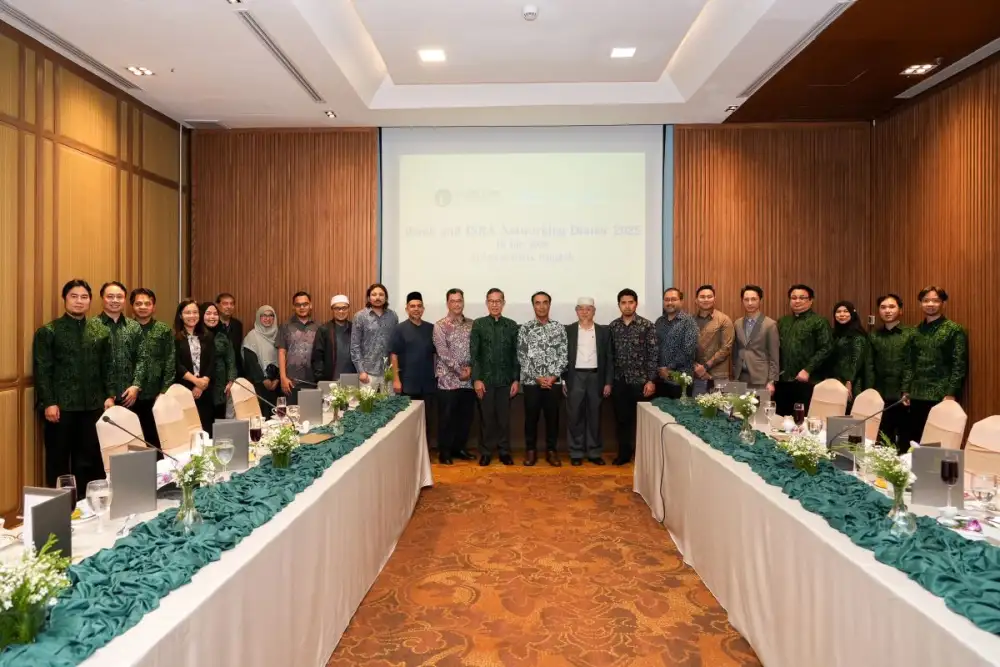
Islamic Bank of Thailand (ibank), under the leadership of Dr. Thaweelap Rittapirom, Director and President, hosted a Working Dinner to foster dialogue on the development of Shariah governance in Thailand. Organized in collaboration with ISRA Consulting, the event brought together high-level delegates from four countriesMalaysia, Indonesia, Brunei, and Singaporeat Al Meroz Hotel, Bangkok, on July 15, 2025.
The purpose of the gathering was to exchange views and share experiences in enhancing Shariah governance frameworks. Among the distinguished guests were senior representatives from Bank Negara Malaysia, the Securities Commission Malaysia, and Shariah and regulatory experts from across the region.
In his welcoming remarks, Dr. Thaweelap emphasized that ibank is the only bank in Thailand operating fully in accordance with Shariah principles. He reaffirmed the Bank's commitment to serving as a national leader in strengthening Shariah governance, which forms the cornerstone of the Islamic financial system. He also shared that the Bank has undertaken a preliminary study to develop a set of Guiding Principles tailored for Thailand, aimed at enabling Islamic finance-related institutions to align with the evolving international standards in Islamic finance.
Asst. Prof. Dr. Maroning Salaeming, Chairman of the Shariah Advisory Council, Islamic Bank of Thailand, presented an overview of the Bank's Shariah governance framework and invited input from the international participants.
Mr. Adnan Zaylani Mohamad Zahid, Deputy Governor of Bank Negara Malaysia, observed that Shariah governance can be structured as either centralized or decentralized, each with its own strengths and challenges. Malaysia employs a centralized model to maintain consistency and regulatory alignment, while other nations opt for decentralized structures for flexibility and responsiveness. He also noted ongoing cooperation between Bank Negara Malaysia and the Bank of Thailand to support the growth of Islamic finance in Thailand.
Assoc. Prof. Dr. Mohamed Eskandar Shah Mohd Rasid, CEO of ISRA International Consulting Sdn Bhd, shared findings from comparative research on Islamic finance development in Muslim-minority countries. A key observation that emerged across the studies was the tendency to adopt models from successful countriessuch as Malaysiawithout adequately considering the differing local contexts of each country.
During the discussion, participants exchanged several key insights. For example, countries such as Malaysia, Indonesia, and Brunei have adopted a two-tier Shariah governance model, featuring both a national Shariah board and internal boards within each institution. While this model offers certain advantages, it also presents challenges. In contrast, Singapore uses the term "Muslim Friendly" instead of "Shariah Compliant," reflecting differences in local regulatory and cultural environments.
Participants also recommended that banks place greater emphasis on developing human resource capabilities alongside enhancing Shariah governance frameworks. Given that the Islamic Bank of Thailand serves a relatively balanced mix of Muslim and non-Muslim customers, it was suggested that the Bank increase its public communications to assure Muslim clients that it operates in full compliance with Shariah principleseven while accepting deposits from non-Muslim customers.
Given ibank's balanced client base of Muslims and non-Muslims, participants also recommended the Bank further communicate its strict adherence to Shariah principles to assure Muslim customers, even while serving a diverse clientele.
This event marked a pivotal step in building a regional network for collaboration, aiming to advance Islamic finance and elevate Shariah governance standards sustainably across Southeast Asia.